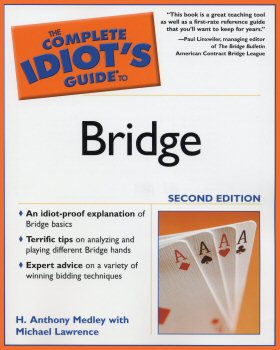| The first edition of Complete Idiot's Guide to Bridge by H. Anthony Medley was the fastest selling beginning bridge book, going through more than 10 printings. This updated Second Edition includes some modern advanced bidding systems and conventions, like Two over One, a system used by many modern tournament players, Roman Key Card Blackwood, New Minor Forcing, Reverse Drury, Forcing No Trump, and others. Also included is a detailed Guide to Bids and Responses, along with the most detailed, 12-page Glossary ever published, as well as examples to make learning the game even easier. Click book to order. | ||
| Brideshead Revisited (8/10) by Tony Medley Shortly after this films starts, new student Charles Ryder (Matthew Goode) is walking around Oxford with a relative, an upperclassman, who is giving him some advice. They walk by a canal and someone is making a fool of himself singing at the top of his voice on a gondola. His relative says, “Those are sodomites; stay away from them or you’ll regret it.” That night Sebastian Flyte (Ben Whishaw), a lord, bursts into Charles’ room and throws up. The next day Sebastian sends Charles flowers and an apology. Sebastian is one of the sodomites against whom Charles had been warned. But, apparently, Charles is, too. Thus begins Charles’ odyssey with the Flyte clan, who live at Brideshead, a spectacular English manor, as regaled in Evelyn Waugh’s 1945 novel and recounted in the almost interminable PBS miniseries that lasted, what, forever? (actually 11 hours). This is a wonderfully told, beautifully filmed retelling of Waugh’s story. Some of the set piece scenes are so astonishingly crafted they look like impressionist paintings. The cinematography (Jess Hall) is stunning. While the film lasts too long, 133 minutes, just about every scene is worth the wait. Director Julian Jarrold has done a sensitive, penetrating interpretation, aided immeasurably by a good script by Jeremy Brock and Andrew Davies. Charles is accepted as a part of the Brideshead family by Sebastian’s mother, Lady Marchmain (Emma Thompson), who is a devout Catholic, and therein lies the rub. She is so devout and so domineering that she has run her husband, Lord Marchmain (Michael Gambon), off to Venice where he lives with his mistress, Cara (Greta Scacchi). Problems arise when Charles meets Sebastian’s sister, Julia (Hayley Atwell). This fouls everything up for everyone because apparently Charles is bisexual and terribly taken with Julia. Jarrold, Brock, and Davies have apparently changed the chronology and essence from the book, but what they’ve done works for a story that can be told in cinematic format. While told from Charles’ POV, the story hinges on Lady Marchmain’s psychological dominance over her son and daughter, and how each reacts. It puts a terrible strain on Charles as Julia struggles with her Catholic heritage and whether she can free herself from the influence of her domineering mother. This type of movie is generally not my cup of tea, but I was fascinated by the way Jarrold tells the story and the stunning cinematography and set design. The acting is superb, especially Thompson, Atwell, and Whishaw. Atwell makes Julia inscrutably desirable. Her beauty grew on me as the movie progressed. Whishaw makes Sebastian’s doomed life entirely believable. I’ve never seen Thompson give a bad performance and she’s at the top of her game here. Goode is the glue that holds all these troubled characters together, and he accomplishes that task with aplomb. I wouldn’t have believed it, but I really enjoyed this movie.
|
||
|
|
||
